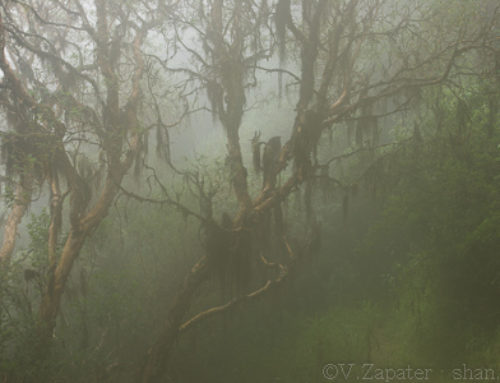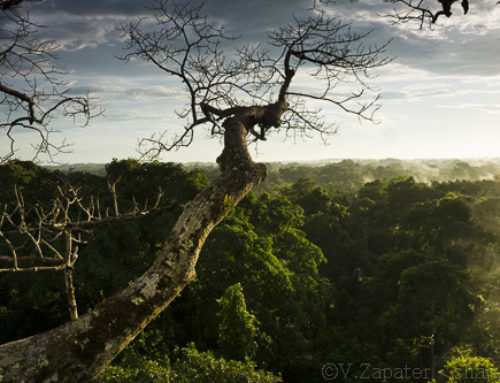Texto: David Biller. Fotos: Valentí Zapater. (Ir a la primera entrada o bien al índice)
If you want to read it in English see below.

David Biller y los Waorani remando en el río Yasuní. Parque Nacional Yasuní (Orellana, Ecuador)
Durante uno de los primeros días navegamos en canoa por el río Yasuní y seguimos una adorable tropa de monos ardilla . De repente el bosque estalló con su agudo chillido. Los monos bajaron a la parte inferior de las ramas y las garras de un gavilán pollero, cerniéndose para matar, sólo encontraron madera antes de deslizarse sobre nuestras cabezas, ya sin monos a su alcance. Más tarde, Pedro Enomenga, Dan y yo nos sentamos en un árbol a más de 16 m sobre el agua, fumando cigarrillos húmedos, mientras esperábamos nuestro viaje de regreso a la guardianía. Fue en este lugar tan apropiado que Pedro nos habló sobre el águila harpía – la más grande y fuerte de toda América. Hace su nido en las plataformas de los imponentes ceibos, bebe agua de las orquídeas epífitas más altas y, como otras rapaces de la selva, caza monos. Pero, a diferencia de los halcones, la arpía siempre da en el blanco.
Pedro también nos preguntó acerca del noviazgo y el matrimonio en los EE.UU., entonces nos explicó el ritual Waorani de las uniones (en oposición a los matrimonios). En la cultura Waorani se coquetea con una chica o viceversa, y los ancianos hacen de casamenteros. Traen a la joven pareja, los rodean y cantan “Que estéis unidos, no separados, que cuando él [ella] regrese le sirva chicha”.
Pedro tiene una esposa, Yolanda, y tienen un niño pequeño. A los dos años, Nampa aún no tiene segundo nombre, y él querría saber si tengo alguna sugerencia. Un amigo de Pedro había sugerido Usnavy: «Marina de los EE.UU.», un nombre derivado de “US Navy”. A menudo he oído a un amigo de un amigo de un amigo que tenía ese nombre, pero siempre creí que era una leyenda urbana. Nunca antes había conocido a alguien que realmente estuviera pensando en dar ese nombre a su hijo, y yo estaba en una posición única para intervenir y prevenir calamidades. El primer nombre del niño, Nampa, es el mismo que el árbol que utilizan los Waorani para hacer dardos, así que le sugerí Fiel. Él me preguntó qué quería decir, y yo le dije que es la característica de alguien con quien se puede contar, que es leal, que te obedece, que te respeta. Alguien que es honesto o con valores elevados. Él dijo que le gustaba, y me pidió que lo escribiera por él cuando llegáramos a la guardianía para que pudiera estar seguro de recordarlo. Me sentí honrado de que mi sugerencia le hubiera llegado al corazón, y ahora estoy contento de que haya un Usnavy menos en América Latina.

Charlando de noche con Pedro y Edgar en la guardianía Tambococha. Parque Nacional Yasuní (Orellana, Ecuador)
Una noche en la guardianía Pedro recogió el libro que estaba leyendo, Salvajes, de Joe Kane, y señaló la cubierta. «Es Moi», dijo. «Es mi primo.» Dan y yo no podíamos creer cuan impertérrito parecía cuando vió a su primo en la portada del libro. Él también miró las fotos del interior, y vio una foto de su abuelo, un chamán jaguar. Cuando me dijo que no tenía una foto para recordarlo, arranqué la página para que la guardara. Pedro nos dijo que quería venir a los EE.UU. para estudiar inglés, con lo que podría guiar a los ecoturistas que no hablan castellano. (Y probablemente todavía lo quiere, por si alguien por ahí en la red está en condiciones de facilitárselo).
Continúa en La selva (2a parte).
Words: David Biller. Photography: Valentí Zapater. (Go to the first post or to the index)
Si quieres leerlo en castellano mira más arriba.

David Biller and Waorani people paddling on Yasuni river. Yasuni National Park (Orellana, Ecuador)
On one of the first days, we canoed along the Yasuní River and followed an adorable troop of squirrel monkeys. Suddenly the forest erupted with their high-pitched screeching. They swung down to the underside of the branches and the talons of a Roadside Hawk, swooping in for the kill, found only wood before gliding out over the our heads with no monkey in his grasp. Later, Quemontare “Pedro” Enomenga, Dan and I sat 50 feet above the water in a tree, smoking damp cigarettes as we waited for our ride back to the guard post. It was in this altogether appropriate place that Pedro told us about the Harpy Eagle – the largest, strongest eagle in the Americas. It makes its nest in the cradle of the imposing Ceiba tree, drinks water from the cups of tree-top orchids and, like other jungle raptors, hunts monkeys. But, unlike the Roadside Hawk, a Harpy never misses its mark.
Pedro also asked us about dating and marriage in the US, then told us about the Waorani ritual of unions (as opposed to marriages). In Waorani culture you flirt with a girl or vice versa, and the elders play matchmaker. They bring the young couple together, encircle them, and sing “Que estén unidos, que no se separen, que cuando regresa él le sirves chicha.” (May you be united, not separate, and when he returns [she] must serve him chicha.)
Pedro has a wife, Yolanda, and they have a little boy. At age two, Nampa still has no middle name, and he wanted to hear if I had any suggestions. A friend of Pedro’s had suggested Usnavy: a name derived from “US Navy.” I’ve often heard a friend of a friend of a friend had that name, but always assumed it was urban legend. Never before had I met someone actually thinking about giving that name to their child, and I was in the unique position to intervene and prevent calamity. His boy’s first name, Nampa, is the same as the tree the Waorani use to make darts, so I suggested “Fiel” (faithful). He asked me what it meant, and I told him it’s the characteristic of someone who can be counted on, who is loyal, who obeys you, respects you. Someone who is honest, or filled with strong beliefs. He said he liked it, and asked me to write it out for him when we got back to the guard post so he could be sure to remember. I felt honored he’d taken my suggestion to heart, and am now glad there’s one less Usnavy in Latin America.

Chatting at night with Pedro (Waorani ranger) and Edgar (responsible from Tambococha guardianship). Yasuni National Park (Orellana, Ecuador)
At the guard post one night, Pedro picked up the book I was reading, Savages by Joe Kane, and he pointed to the cover. “That’s Moi,” he said. “He’s my cousin.” Dan and I couldn’t get over how unmoved he seemed at finding his cousin on the cover of a book. He also looked at the photos inside, and saw a photo of his grandfather, a jaguar shaman. When he told me he didn’t have a picture to remember him by, I ripped out the page for him to keep. Pedro told us that he wanted to come to the US to study English, so that he could guide ecotourists who don’t speak Spanish. (And he probably still wants to, if anyone out there in internet-lands is in a position to facilitate).
It continues at The jungle (2nd part).




Deja tu comentario